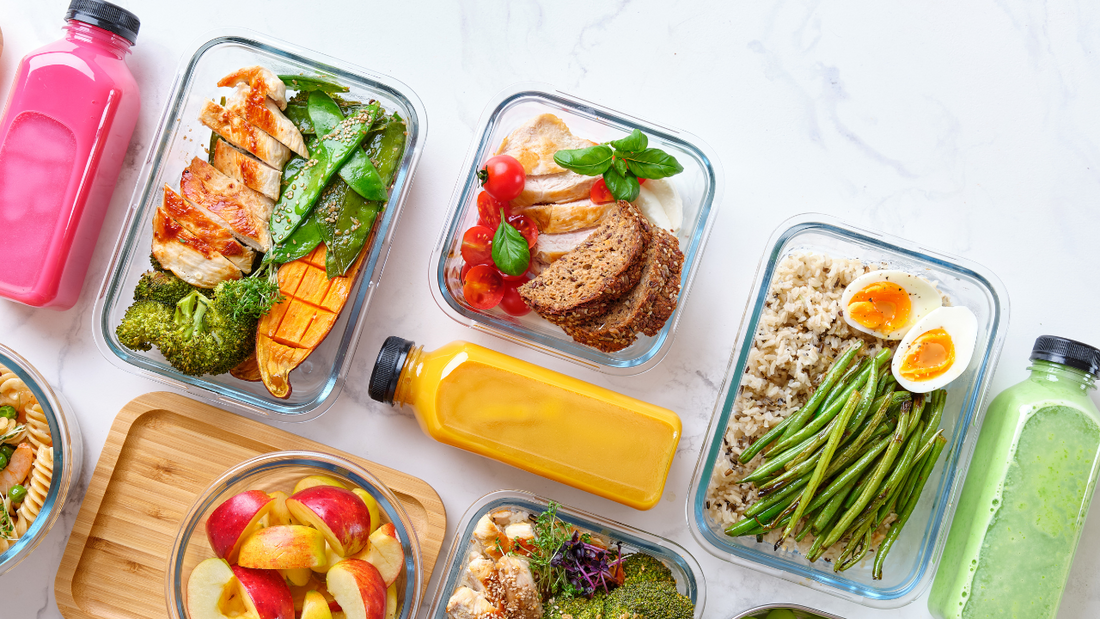In the quest for a healthier lifestyle, meal preparation, or meal prep, has emerged as a powerful tool to support nutritious eating habits. Meal prep involves planning, preparing, and portioning meals in advance, making it easier to maintain a healthy diet amidst our busy lives. In this comprehensive guide, we will explore the benefits of meal prep, provide practical tips for beginners, and highlight strategies to make meal prep an enjoyable and sustainable practice.
The Benefits of Meal Prep
Meal prep offers numerous advantages for those seeking to adopt a healthier diet. Time Efficiency: By dedicating a specific block of time to prepare meals in advance, you can save valuable time throughout the week. With meals readily available, you eliminate the need for frequent cooking and can focus on other priorities.
Portion Control: Preparing meals in advance allows you to portion your food according to your nutritional needs. This helps in managing portion sizes, preventing overeating, and promoting weight management.
Nutritional Balance: Meal prep empowers you to plan well-rounded, nutritious meals in advance. It gives you control over ingredients, ensuring a balance of macronutrients (carbohydrates, proteins, and fats) and essential micronutrients (vitamins and minerals).
Cost Savings: By planning your meals and buying ingredients in bulk, you can save money in the long run. Meal prep reduces the temptation to eat out or rely on convenience foods, which are often more expensive.
Reduced Stress: With meals prepared in advance, you eliminate the daily stress of deciding what to eat and scrambling to put together a healthy meal. Meal prep brings structure and peace of mind to your eating routine.
Getting Started with Meal Prep
If you're new to meal prep, these practical tips will help you establish a successful routine:
Plan your meals: Start by selecting recipes or dishes you enjoy and create a meal plan for the week. Consider your dietary goals, preferences, and any dietary restrictions. Keep a well-rounded mix of proteins, whole grains, vegetables, and healthy fats in mind.
Make a shopping list: Based on your meal plan, create a comprehensive shopping list. This will help you stay organized and ensure you have all the necessary ingredients on hand.
Batch cooking: Dedicate a specific day or time to prepare larger quantities of ingredients such as grains, proteins, and roasted vegetables. Cook in bulk, portion the food, and store it in meal-sized containers.
Utilize storage containers: Invest in a variety of reusable, microwave-safe containers in different sizes. These will help you portion and store your meals conveniently. Opt for glass or BPA-free plastic containers for durability and safety.
Consider freezer-friendly meals: Some meals, such as soups, stews, and casseroles, can be prepared in larger batches and frozen for future consumption. This expands your meal options and allows for greater flexibility.
Practice safe food handling: Proper food safety is crucial when meal prepping. Ensure that you store perishable items in the refrigerator promptly and follow appropriate storage and reheating guidelines.

Meal Prep Tips for Success
Start small: Begin with prepping a few meals or snacks at a time to avoid feeling overwhelmed. Gradually increase the number of meals you prepare as you become more comfortable with the process.
Keep it simple: Choose recipes that are easy to prepare and require minimal cooking time. Look for meals that use common ingredients and basic cooking techniques to streamline your meal prep routine.
Embrace variety: Plan for variety in your meals to keep things interesting and prevent boredom. Experiment with different flavors, textures, and cuisines to make your meals enjoyable.
Incorporate fruits and vegetables: Include a generous amount of colorful fruits and vegetables in your meal prep. Chop vegetables in advance or keep pre-washed and cut fruits handy for easy snacking or adding to meals.
Use marinades and sauces: Prepare flavorful marinades, dressings, and sauces ahead of time. These can enhance the taste of your meals and make them more enjoyable.
Mindful storage and labeling: Properly label and date your meal containers for easy identification and to ensure that you consume them within a safe timeframe.
Long-Term Sustainability
To make meal prep a sustainable practice, consider the following:
Find your rhythm: Experiment with different meal prep schedules to determine what works best for you. Some prefer prepping meals for the entire week, while others find it more manageable to prep every few days.
Stay inspired: Explore new recipes, cookbooks, and online resources to keep your meals exciting and diverse. Join online communities or forums where individuals share meal prep ideas and success stories.
Flexibility and adaptation: Embrace flexibility in your meal prep routine. Adjust your plan as needed to accommodate changes in your schedule or dietary preferences.
Listen to your body: Pay attention to your hunger cues and adjust portion sizes accordingly. Be open to adapting your meal prep routine based on your changing nutritional needs and goals.
Enjoy the process: View meal prep as a creative and empowering practice. Involve family members or friends in the process, play your favorite music, and make it an enjoyable part of your routine.
Conclusion
In a world filled with hectic schedules and fast-paced lifestyles, meal prep emerges as a powerful solution to maintain a healthy diet and support overall well-being. By investing a little time and effort into planning and preparing meals in advance, you can reap a multitude of benefits that extend far beyond just convenience.
Meal prep offers time efficiency, allowing you to reclaim precious minutes in your day that would otherwise be spent on daily cooking and meal decisions. It provides an opportunity for portion control, ensuring that you consume appropriate amounts of food and maintain a balanced diet. With meal prep, you have the ability to curate meals that are nutritionally balanced, packed with wholesome ingredients, and aligned with your dietary goals.
Moreover, meal prep can lead to cost savings by minimizing impulse purchases and reducing reliance on takeout or pre-packaged convenience foods. By choosing your ingredients thoughtfully and in larger quantities, you can make smart financial choices and optimize your grocery budget.
Beyond the practical benefits, meal prep fosters a mindful and intentional approach to eating. It allows you to prioritize your health and well-being by taking proactive steps towards nourishing your body with wholesome meals. By planning and preparing your meals in advance, you create a foundation for success in adhering to a healthy eating pattern.

To embark on a successful meal prep journey, start small and gradually incorporate this practice into your routine. Experiment with recipes, flavors, and cooking techniques to keep your meals exciting and enjoyable. Remember to embrace variety, incorporating a diverse range of ingredients to provide a wide array of nutrients and flavors.
Flexibility and adaptability are key to sustaining meal prep as a long-term practice. Listen to your body's needs, adjust portion sizes accordingly, and be open to modifying your meal prep routine as your nutritional goals and preferences evolve. It's important to view meal prep as a creative and empowering endeavor rather than a mundane task. Engage in the process, involve loved ones, and make it an enjoyable part of your lifestyle.
Ultimately, meal prep empowers you to take control of your nutrition, enhance your overall well-being, and foster a healthy relationship with food. It allows you to make conscious choices, prioritize self-care, and set yourself up for success in achieving your health goals.
So, embrace the transformative power of meal prep. Embrace the convenience, the nourishment, and the joy it brings to your life. By dedicating a little time upfront, you pave the way for a healthier, more balanced lifestyle that supports your well-being in the long run. Start today, and embark on a journey towards better health, one meal at a time.

